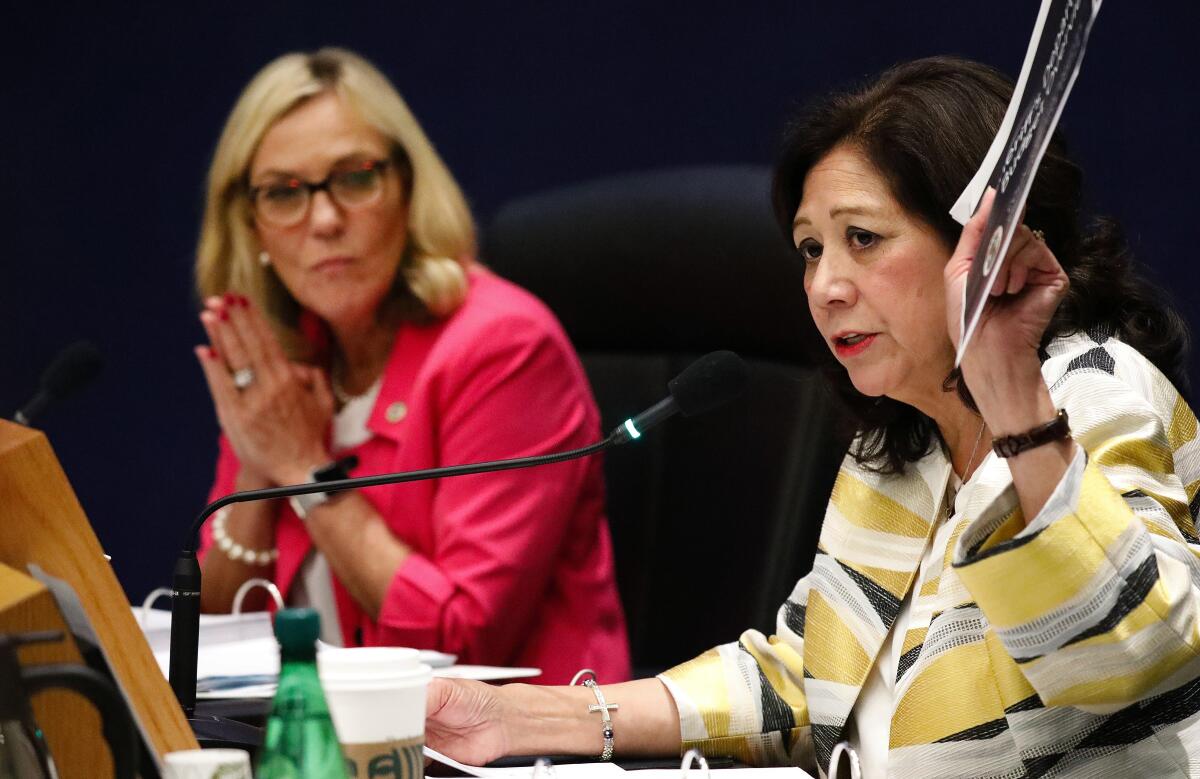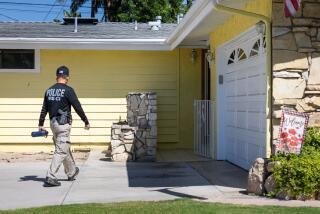Two L.A. County supervisors tout pandemic safety, but put own employees at risk, staffers say

Los Angeles County Supervisors Hilda Solis and Kathryn Barger have made clear their views on ways to minimize risky behavior during the pandemic.
Residents are “safer at home,” both have repeatedly said at coronavirus news briefings since March.
But some of their own employees say the supervisors have failed to keep them safe.
The two supervisors, say the employees, have required them for weeks to work in unsafe conditions at the county administration building and in district field offices, and ignored their pleas to allow them to work from home. The complaints surfaced in an anonymous letter from members of both staffs that was circulated among county executives and provided to The Times.
The letter’s authors — who describe themselves as “many members of the staff of the 1st and 5th District” — make the case that several people working at the county’s Hall of Administration are “young employees that are going to bars and restaurants and are at higher risk of contracting and spreading the virus.” The employees also allege that the supervisors are not enforcing the L.A. County Department of Public Health’s guidelines at any of their offices.
They say the three other supervisors — Mark Ridley-Thomas, Sheila Kuehl and Janice Hahn — have allowed their entire staffs to work remotely.
“They feel entitled to require staff to report back to their offices although their work can be performed remotely. It would be impossible for them to make a case that we need to be in our office spaces to perform our duties,” reads the letter, referring to Solis and Barger.
Solis and Barger employ about 75 full-time staffers between them who work on the eighth floor of the county’s Hall of Administration building downtown and in field offices across their districts.
The anonymous letter draws unwelcome attention to the workplace practices of the supervisors as the county struggles to control a surging coronavirus infection rate.
The supervisors say that their policies on teleworking have varied over time because of technology issues and the importance of meeting the needs of their districts. Some of their responsibilities, they say, involve providing essential services for residents. Barger is board chair, which comes with additional administrative duties.
Solis, who served as President Obama’s Secretary of Labor from 2009-13 and has been a vocal critic of employers failing to protect workers, said in a statement that she takes employee feedback seriously and that she has asked the county’s human resources department to “carefully review the claims in the anonymous letter relating to employee safety.”
Solis said because she is chair pro tem — meaning she will become board chair in December — her office has “increased responsibilities in responding to this crisis and running the business of the county.”
“While some of the vital services our constituents are relying on to get through these unprecedented times can be provided via telework, most cannot,” Solis said. Her staffers, she said, have provided assistance at food distribution centers and helped distribute personal protective equipment at nursing homes, among other pandemic-related duties.
“I am proud of the efforts of my staff in some of the hardest impacted communities in the county,” she said in the statement.
Since the letter surfaced and The Times requested a response from Solis, working conditions appear to have improved, with employees now granted more telework options, according to a staffer who spoke with The Times. The staffer requested anonymity because employees are not authorized to speak with the media.
In an email sent earlier this week to staffers, Solis chief of staff Cindy Chen wrote that employees were going to be allowed to telework again beginning July 21.
“However, we will evaluate telework on a week-by-week basis based on the emergent needs of our supervisor and maintaining the needs of our constituents, and community,” Chen wrote.
Barger, whose geographically massive district encompasses 2,807 square miles of north L.A. County, said her office implemented “a modified work schedule that enables all staff to telework on staggered days.”
Currently, staff work remotely 50% of the time and in the office the other half. The use of teleworking as an option for employees has “fluctuated over time” and was most recently reinstated July 14, according to Barger’s office. This was after employees sent their letter.
Before teleworking was reinstated, “the expectation was that staff would be there,” according to Barger’s office.
Part of the issue with transitioning to teleworking was that, in March, staff started working from home but didn’t have work laptops. Only a few staff members have since gotten work laptops, and the office was told that it will take six weeks to get laptops and docking stations for all staff who need them, according to Barger’s office.
“Our staff cannot serve our communities well if they are not healthy and safe,” Barger said. “My office struck a delicate balance between ensuring the health and safety of our team and maintaining accountable and responsive services that the residents of Los Angeles County deserve.”
Other supervisors have taken a different approach.
In Supervisors Kuehl’s and Hahn’s offices, all employees are working from home, and rarely go into the office. None of their field offices are open.
In Ridley-Thomas’ offices, the majority of staff are working from home, and no one is required to come in. Some work from the office because either its their preference or they need to help on a board meeting day. Field offices remain open.
Hahn’s communications director Liz Odendahl said Hahn, who has long been a proponent of teleworking, moved quickly to provide any staff with laptops if they didn’t have them and other materials needed to start working from home in early March.
“We haven’t lost a step,” Odendahl said in an email. “Aside from staff missing being able to physically see each other, our office has been running very smoothly and we have been able to keep serving our constituents remotely.”
In Kuehl’s 3rd District, no field offices are physically open. Rather, everyone telecommutes and does their casework from home.
These staffers have performed limited field work, including distributing boxes of food at drive-through food distribution events for residents.
“Everyone working those events must wear masks and gloves and physically distance,” Kuehl said in a statement. “We are very serious about all volunteers/staff at those events being safe.”
More to Read
Sign up for Essential California
The most important California stories and recommendations in your inbox every morning.
You may occasionally receive promotional content from the Los Angeles Times.











